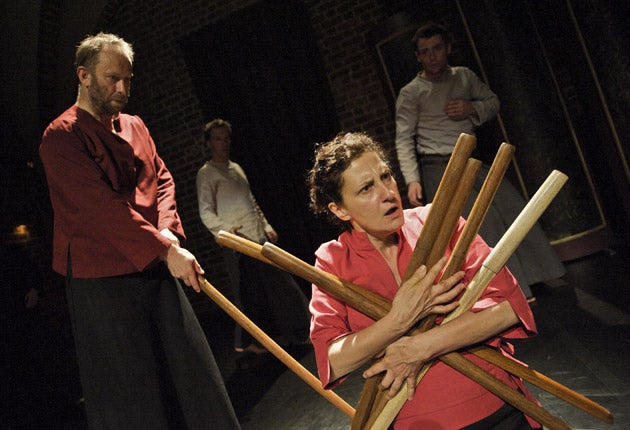Macbeth, The Pit, Barbican Centre, London

Your support helps us to tell the story
From reproductive rights to climate change to Big Tech, The Independent is on the ground when the story is developing. Whether it's investigating the financials of Elon Musk's pro-Trump PAC or producing our latest documentary, 'The A Word', which shines a light on the American women fighting for reproductive rights, we know how important it is to parse out the facts from the messaging.
At such a critical moment in US history, we need reporters on the ground. Your donation allows us to keep sending journalists to speak to both sides of the story.
The Independent is trusted by Americans across the entire political spectrum. And unlike many other quality news outlets, we choose not to lock Americans out of our reporting and analysis with paywalls. We believe quality journalism should be available to everyone, paid for by those who can afford it.
Your support makes all the difference.Poland's Song of the Goat Theatre company – their name alludes to the Greek word for tragedy – created a stir in 2004 with Chronicles: A Lamentation, a startling 45-minute piece based on the epic of Gilgamesh.
They now reappear with an intense 70-minute summation of Macbeth, first seen as a work-in-progress in the RSC's Complete Works season and derived from "several years of improvisation and rehearsal".
One cannot help but be impressed by the company's blending of balletic, martial-arts movement and polyphonic chanting. The production takes its pulse from the musician Rafal Habel, who saws and plucks a stringed Korean instrument called a kayagum. There are bursts of Corsican and Georgian liturgical chorales and the sung incantations of the witches, spread through the seven-strong company, turn the play into a dark tone poem.
The result, though, struck me as theatrical rather than dramatic. In contrast to the rhythmic discipline of the music, the international cast – which includes Gabriel Gawin's rugged, sweatingly anxious Geordie Macbeth and a blood-curdling, wholly unsympathetic Anna Zubrzycki as his spouse – gabble and mis-stress the verse. The company are happiest when operating as a single organism; the military atmosphere is heightened by much athletic wielding and hurling of staves, expressively so when they cleave the air around Macbeth as he contemplates the spectral dagger. But the emphasis on democratic group skills feels counterproductive in a tragedy that is designed to take us into the haunted consciousness of its hero. The soliloquies are swamped by the underscoring and stage pictures formed by other characters.
Cheek By Jowl's version, seen here in the spring, matched Grzegorz Bral's production in ensemble flair while generating what eludes the Polish company: a palpable sense of evil and its psychological penalties.
To 20 November (0845 120 7500)
Join our commenting forum
Join thought-provoking conversations, follow other Independent readers and see their replies
Comments